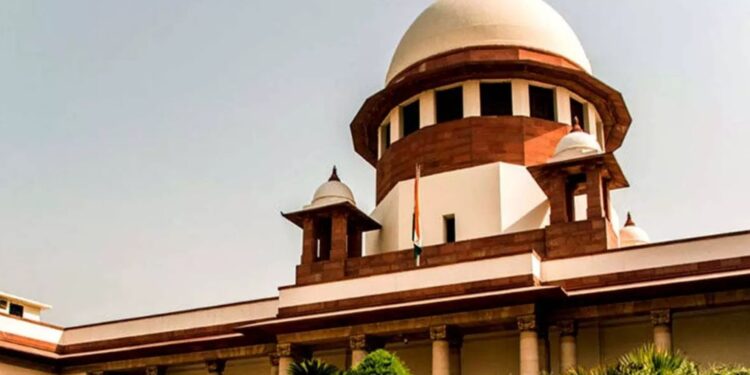In a significant judgment delivered by the Supreme Court on Thursday, a Constitution Bench ruled that eligibility criteria or rules governing the selection process for government jobs cannot be changed midway or after the recruitment process has begun unless expressly permitted by pre-existing regulations. This decision, stemming from Tej Prakash Pathak v. Rajasthan High Court, reaffirms a fundamental legal principle regarding fairness and transparency in government recruitment.. The Bench, led by Chief Justice of India DY Chandrachud and comprising Justices Hrishikesh Roy, PS Narasimha, Pankaj Mithal, and Manoj Misra, reserved this judgment in July 2023, bringing closure to an issue with far-reaching implications for public Employment.
Issue at Hand
The primary question before the Court was whether authorities could modify the selection criteria for a government job after the recruitment process had already commenced. Essentially, the Court examined whether altering rules mid-recruitment would be akin to changing the “rules of the game” partway through, thereby impacting candidates who entered the process under certain expectations. The Court’s ruling draws a firm line on this issue, stating that changing eligibility requirements midway is impermissible unless expressly allowed by the governing rules.
In reaching this conclusion, the Court upheld the earlier decision in K Manjusree v. State of Andhra Pradesh (2008), a precedent that held that recruitment rules cannot be altered once a process is in progress. The Court’s endorsement of K Manjusree as “good law” signifies its commitment to maintaining consistency and preventing arbitrary rule changes, especially those that might disadvantage applicants.
The Role of ‘K Manjusree’ and ‘Marwaha’ Judgments
The Bench addressed a critical legal issue by reaffirming the validity of the K Manjusree ruling despite its lack of reference to the Supreme Court’s earlier judgment in State of Haryana v. Subash Chander Marwaha (1973). In Marwaha, the Court held that achieving minimum marks in a public examination does not guarantee a selection right. The government can establish a higher threshold to ensure suitable standards for public positions if needed. While this principle recognizes the government’s discretion in upholding high standards, the *K Manjusree* ruling prioritized the consistency and transparency of the recruitment process, which the Court found crucial in its current decision.
Key Takeaways from the Judgment
1. Defining the Recruitment Process: The Supreme Court clarified that the recruitment process starts with the call for applications and concludes once vacancies are filled. Any changes to eligibility criteria within this timeframe, without a pre-existing rule allowing such adjustments, would undermine the integrity of the process.
2. Restriction on Midway Changes: The ruling emphasizes that eligibility criteria should remain constant from recruitment to its conclusion. Exceptions can only be made if a specific provision within the rules allows changes during recruitment.
3. Adherence to Constitutional Standards: The Court noted that recruitment rules are subject to constitutional standards, particularly those enshrined in Articles 14 and 16, which ensure equality and non-discrimination in public Employment. Any rule with statutory force that appears arbitrary would be at odds with these constitutional guarantees.
4. Placement on a Selection List Doesn’t Guarantee Employment: The Bench underscored that merely being placed on a selection list does not create an absolute right to Employment, highlighting the distinction between eligibility and entitlement.
5. Endorsement of ‘K Manjusree’ as Valid Law: By endorsing K Manjusree as valid law, the Court asserted that this case establishes a necessary standard, even if it did not consider the implications of Marwaha.
Case Background and Proceedings
The case arose from the Rajasthan High Court’s recruitment process for 13 translator positions. Initially, candidates were required to undergo a written test followed by an interview. Out of 21 candidates, only three were selected after it was determined that a 75% minimum threshold—an unstated criterion set by the High Court’s Chief Justice—was necessary for selection. This adjustment, made without prior notification, disqualified most candidates who had otherwise met the initial requirements.
Three unsuccessful candidates subsequently challenged the decision, filing a writ petition because the new 75% threshold amounted to “changing the rules of the game after the game had begun.” They referenced K Manjusree as supporting case law. In March 2023, a three-judge Supreme Court Bench led by Justice RM Lodha (retired) acknowledged that strict adherence to the K Manjusree ruling would require the Rajasthan High Court to appoint all 13 candidates instead of only three. However, Justice Lodha’s Bench also noted that this might not serve the broader goal of ensuring efficient administration, suggesting that a more comprehensive examination was necessary.
The Marwaha case, which the Bench also considered, involved the recruitment of civil judges in Haryana, where the government set a higher score threshold after an initial selection process to maintain standards in judicial appointments. The Punjab and Haryana High Court had initially ruled in favour of unsuccessful candidates. Still, the Supreme Court reversed this decision, highlighting the government’s authority to set higher standards as needed.
Implications and Finality
The Supreme Court’s ruling clarifies the parameters of government recruitment processes. By emphasizing the importance of consistent rules and fair practices, the Court has established a precedent that will likely influence future cases involving public sector employment and recruitment procedures. For candidates and public institutions alike, the decision serves as a reminder that while authorities have discretion in setting standards, this discretion cannot override the principles of fairness and transparency that underpin the rule of law.
This ruling reinforces the idea that public recruitment processes are not just procedural, but are governed by constitutional principles that guarantee equal opportunity, fair treatment, and predictable outcomes for all involved.

















